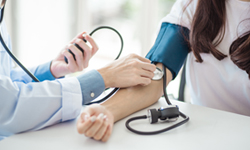The risk of hypertension is determined by lifestyle factors and increases with age. Usually, hypertension affects men and women in the age group of 65 years and older. But with the current rise in unhealthy eating habits and a sedentary lifestyle, there has been an increase in the cases of children, adolescents and young adults under the age of 40 suffering from this disease.This is a reason for alarm, no doubt. To further understand hypertension in young adults, let’s take a look at the factors responsible.
Hypertension In Young Adults
 The causes of hypertension can be primary or secondary. 90% of young adults suffer from primary hypertension, while 10% may have secondary hypertension.
The causes of hypertension can be primary or secondary. 90% of young adults suffer from primary hypertension, while 10% may have secondary hypertension.
Primary Hypertension – Hereditary, obesity and the environment play a role in primary hypertension, also known as essential hypertension. An increase in obesity in children can be a risk factor for this type of hypertension.
Secondary Hypertension – The causes of secondary hypertension could be renal parenchymal disease, renovascular disease, mineralocorticoid-mediated hypertension, catecholamine-mediated hypertension, use of medicines like oral contraceptive pills, abuse of illicit drugs or methamphetamines, or coarctation of the aorta.
Diagnosing Young Hypertensives
 Most young patients may not show symptoms and the disease is usually diagnosed during screening. A mercury sphygmomanometer can be used to measure blood pressure which should be confirmed with multiple readings and a 24-hr ambulatory blood pressure monitoring. Patients are examined for:
Most young patients may not show symptoms and the disease is usually diagnosed during screening. A mercury sphygmomanometer can be used to measure blood pressure which should be confirmed with multiple readings and a 24-hr ambulatory blood pressure monitoring. Patients are examined for:
- A high body mass index (BMI) and increased waist circumference
- Insulin resistance
- Primary renal disease or renal damage
- Retinal hypertensive changes
Secondary hypertension can be diagnosed by:
- An inconsistent pulse
- Radiofemoral delay
- Abdominal bruits
- Sweating & tachycardia
Treatment For Young Hypertensives
 A complete lifestyle overhaul is recommended for young patients diagnosed with hypertension. This includes losing weight through regular exercise, including fresh fruits and vegetables in the your high blood pressure diet, reducing the intake of salt and saturated fat, cutting out refined carbohydrates and avoiding junk food. It’s essential to restrain alcohol and cease the use or consumption of all tobacco products. In case of substance abuse, patients should seek counselling and rehabilitation treatment.
A complete lifestyle overhaul is recommended for young patients diagnosed with hypertension. This includes losing weight through regular exercise, including fresh fruits and vegetables in the your high blood pressure diet, reducing the intake of salt and saturated fat, cutting out refined carbohydrates and avoiding junk food. It’s essential to restrain alcohol and cease the use or consumption of all tobacco products. In case of substance abuse, patients should seek counselling and rehabilitation treatment.
In young hypertensives, medication should be administered only if lifestyle changes do not lower blood pressure or if they suffer from organ damage, secondary causes of severe hypertension. The treatment for hypertension in young patients includes the same first-line medicines that are used for adults like thiazide or thiazide-like diuretics, calcium channel blockers, and either an angiotensin-converting enzyme (ACE) inhibitor or angiotensin receptor blocker. Diuretics should only be reserved in cases of more severe hypertension to prevent long-term metabolic consequences such as susceptibility to diabetes mellitus.
Young adults should go in for a specialist evaluation, investigation and treatment if their blood pressure is detected as greater than 180/110 mmHg or if there are complications of organ damage, secondary causes of resistant hypertension.
In conclusion, the best treatment for high BP in young adults would be to address their sedentary and unhealthy lifestyle habits and bring in correct, healthy, long-term alterations.
For a regular screening and check-up, as well as the right diagnosis and treatment for high blood pressure, you can consult and book an appointment with a trained physician.
Note of caution: This article is for information purpose only. Always consult your doctor in case of any blood pressure or other health related problems.
Disclaimer
The information contained in this article is to educate, spread awareness in relation to hypertension and other diseases to the public at large. The contents of this article are created and developed by BPinControl.in through its authors, which has necessary, authorisations, license, approvals, permits etc to allow usage of this articles on The Website. The views and opinions expressed in this article are views, opinions of the respective authors and are independently endorsed by doctors. Although great care has been taken in compiling and checking the information in this article, The Website shall not be responsible, or in any way liable for any errors, omissions or inaccuracies in this article whether arising from negligence or otherwise, or for any consequences arising therefrom. The content of this article is not a substitute for any medical advice. The Website shall not be held responsible or liable for any consequence arising out of reliance on the information provided in the article.




